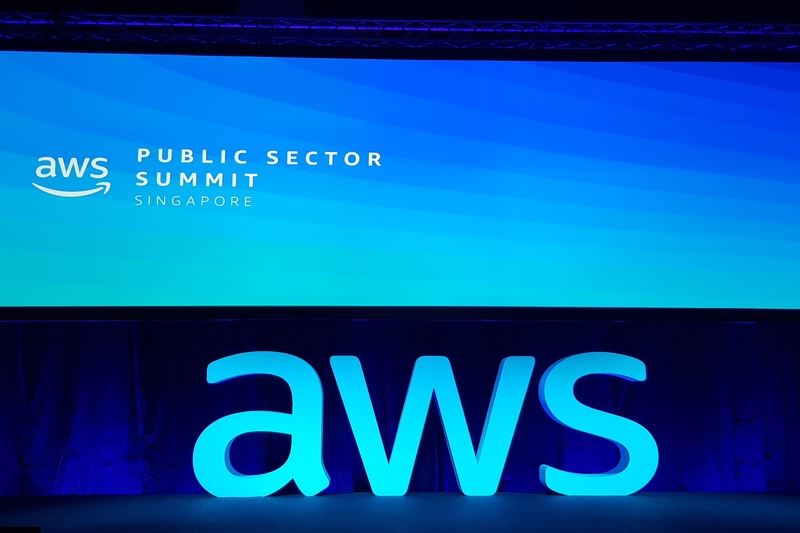
The AWS Public Sector Summit held at the Suntec City Convention Centre on 25 September is the latest cloud computing event in Singapore which saw more than 1500 attendees from Singapore and around the ASEAN region, to learn and gain deeper insights of how cloud technology has been used by government agencies, education institutions and non-profit organisations across the world, and of what they have achieved with Amazon Web Services (AWS).
The day was filled with a series of events from keynote speeches to track sessions, which discussed various topics such as threat detection with AI.
AWS and what it provides
Teresa Carlson, Vice President, Worldwide Public Sector (WWPS) at AWS, shared about the journey of AWS in accelerating the public sector innovation and transformation.
She said that the public sector business focuses on two areas: paving way for disruptive innovation and making the world a better place.
The AWS Singapore Region was launched in 2010. AWS has since been launched in seven other regions across the Asia Pacific. She announced Jakarta, Indonesia, being a new addition to this list and to be launched in early 2022.
AWS provides services according to the requirements of customers. Some of these include data sovereignty, data backup and low latency.
Land Transport Authority (LTA), Networked Trade Platform under Singapore Customs, Singapore Land Authority (SLA), and Singapore University of Social Sciences (SUSS), are some of the customers in Singapore who employ AWS’s services.
Teresa laid out the top advantages of cloud technology: Speed, agility, security, ability to experiment, pay for what you use, and global deployment.
She explained in detail what helps customers move faster in the public sector space with cloud:
- Having a true definition of cloud computing
Eliminating up-front expense, spin up resources when needed, scale with demand, focus on innovation, and deploy globally in minutes.
- Having a cloud-first policy
Agencies and ministries need to think that for any project, cloud technology will be employed first before others. Leadership is needed to drive this. Teresa shared that the USA was the first to start on this before other countries followed suit: Singapore, Japan, Australia, India, Philippines, Brazil, Columbia, United Kingdom, and Bahrain. She added that the UK has adopted a cloud-native policy.
- Security, Privacy and Compliance
Agency leaders should not be guessing what the controls are for a low, medium and high security workload. A regime which is easily understandable without room for doubts is needed. All of AWS’s services are GDPR-ready. AWS has achieved certification for Singapore’s Multi-Tier Cloud Security Standard (MTCS) Level 3 for hosting high confidential data.
She shared about a new service to be rolled out by AWS called “Threat detection using AI”. This service can be easily deployed across governments and public sector customers. It relies on deep learning algorithms to identify threats.
- Procurement vehicles
Example of procurement vehicles in use includes AWS’s Whole of Government agreement with the Commonwealth of Australia in June 2019. The agreement enables Australian Federal, State and Territory agencies and departments, as well as government-controlled public universities and corporations, to access all AWS Cloud services, through a simplified procurement model. This centralised agreement lets agencies save costs from the day they sign up, due to the economies of scale achieved from the aggregated procurement – it removes challenges around raising individual tenders and complex contracting processes.
The Whole-of-Government agreement provides agencies with a steady approach to access and use all the AWS services in any of AWS’s 69 Availability Zones (AZs) spanning 22 Regions around the world, without having to discuss separate contract terms.
- Skills development
It is important to know how to use cloud, a lack of such skills will slow down the cloud-first policy.
Teresa said that experimentation is needed throughout the organizations, as “there is no compression algorithm for experience”.
- Speed and scale
Once the factors above have been refined as a framework in building the culture of cloud in the organization, users can move ahead much faster.
Building a Smart Nation
Tan Kok Yam, Head of Smart Nation Programme, Prime Minister’s Office of Singapore, shared about the ways in which his office has benefited from the use of AWS.
He went into detail on the challenges, solutions and journey for “Building a Smart Nation” in Singapore.
Challenges
Mr Tan shared that the “evergreen problems” of countries are to make the economy more productive, create more jobs, serve businesses and citizens better, and allow innovation to thrive.
Solutions
Building a national digital identity (national digital ID) is one of the Smart Nation office’s plans for addressing these challenges. He mapped out the transformation of Singapore’s national IDs over the years: IC- Singpass- Corpass- MyInfo- National Digital ID.
He said that the formation of an National Digital Identity (NDI) stack is key for providing user-centric services. It will allow for trusted data and trusted identity which will be defined by the government, and for trusted access and trusted services which will be created by the private sector.
He also shared about CODEX (Core Operations Development Environment Exchange), a unified government data architecture, or technology stack, where services and high-quality data can be shared securely across multiple government agencies at a much shorter timeframe. An example close to this will be SingPass.
This allows the Singapore government to be more agile and to build solutions better, cheaper and faster. It also reduces duplicative work, improve delivery, enable compliance, and enhance cybersecurity.
Journey
On the journey ahead, Mr Tan reiterated how cloud is a key enabler of their ambitions. It provides scale and resiliency to governments, individuals and businesses. It also provides richness in services, ease of development, and reduces the need of duplicative work.
Mr Tan pointed out the anticipated challenges along the way, which are the new ways of operating (evolving processes and policies, mindset change needed), new forms of risk and risk management, and legacy systems.
Data mobility and migration
Peter Moore, Regional Managing Director for Asia Pacific and Japan, Worldwide Public Sector, AWS shared about the different services that AWS provides to customers for ensuring data mobility and migration. Some of these include AWS Snowball and AWS DataSync.
He also shared about how artificial intelligence (AI) and machine learning are used for delivering citizen services faster, transform the way students learn, and solve some of our most pressing challenges. Some of these include AI services such as image and speech recognition, creating chatbots, forecasting and recommendations.
OpenGov had the opportunity to gain a deeper insight into AWS and of its cloud capabilities:
Adoption of cloud technology
Peter said that cloud technology is still at the beginning of adoption. He said that some organisations are still using relational database for everything and the technology silos. He talked about how AWS addresses this issue with its comprehensive suite of more than 165 services that range with compute, storage, databases, networking, analytics, machine learning and artificial intelligence (AI), security, deployment, and management, that organizations can access to use any combination of services.
There is no need for organisations to create systems and services from scratch for each specific project but focus on using the cloud services to speed their delivery of projects. He reiterated the characteristics of cloud, which include not having to pay upfront capital, but only for what you use. This mandates the need for a hyper-scale structure which can be used across various organisations.
He added that this allows customers to experiment with ideas, run test and development workloads, develop new applications, and deploy critical applications and services quickly in their cloud adoption journey. AWS provides the infrastructure and customers would just have to employ the services according to their needs.
He stressed about how some governments are still stuck on the traditional ways of managing data due to the lack of understanding and exposure to what cloud services can offer. The lack of technical sophistication and skills are some of the boulders in the speed of these governments adopting cloud technology.
However, the push from citizens to go digital and the adoption of cloud technology by start-ups, and the benefits they enjoy from it, are some of the push factors for adoption amongst governments.
Peter stressed that it is crucial to start embarking on the cloud adoption journey, experiment with cloud services, run workloads, and understand how it functions to leverage the cloud capabilities and accelerate innovation for citizens.
Sharing data on cloud
It is important to acknowledge that cloud provides the platform for multiple environments that can share data amongst one another. While cloud does provide many benefits, it should also provide the security to users that their data will be protected.
Peter said that mindset has shifted from “Can we trust the security of cloud” to organizations are moving to the cloud because it improves their security posture. Peter shared that with the breadth and depth of AWS services, including providing fine-grain security controls and tools for organizations to use in protecting their data and environment, agencies can leverage AWS as their first line of defence , much like a fortress in defending the government systems.
















